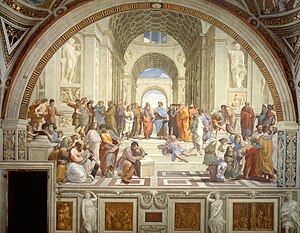
Back ፈላስፋ Amharic Filosofo AN فيلسوف Arabic فيلسوف ARZ Философ AV Filosof Azerbaijani فیلسوف AZB Фәлсәфәсе Bashkir Philosoph BAR Філосаф Byelorussian

| Felsefe |
|---|
| üzerine bir seri |
 |
Filozof, felsefe ile uğraşan kişidir. Filozof kelimesi Antik Yunanca bilgelik aşığı anlamına gelen φιλόσοφος (filosofos) kelimesinden gelir.[1][2] Cicero ve Diogenes Laertius’un, Eflâtun’un öğrencisi Herakleides Pontikos’un bugün elde bulunmayan bir eserine dayanarak verdikleri pek kesin olmayan bir rivayete göre filozof kelimesini ilk kullanan düşünür Pisagor olmuştur. (MÖ 6. yüzyıl)[3]
Klasik anlamda, bir filozof, belirli bir yaşam tarzına göre yaşayan, insanlık durumuyla ilgili varoluşsal soruları çözmeye odaklanan biriydi; teoriler üzerine söylem yapmaları veya yazarlar hakkında yorum yapmaları gerekli değildi.[4] Kendilerini bu yaşam tarzına en zorlu şekilde adamış olanlar filozof olarak kabul edilirdi ve tipik olarak Helenistik felsefeyi izlerlerdi.
Modern anlamda bir filozof, estetik, etik, epistemoloji, bilim felsefesi, mantık, metafizik, sosyal teori, din felsefesi ve siyaset felsefesi gibi bir veya daha fazla felsefe dalına katkıda bulunan bir entelektüeldir. Bir filozof aynı zamanda sanat, tarih, ekonomi, sosyoloji, psikoloji, dilbilim, antropoloji, teoloji ve politika gibi yüzyıllar boyunca felsefeden ayrılan beşeri bilimler veya diğer bilimlerde çalışmış biri olabilir.[5]
- ^ "Filozof Ne Demek? Tdk'da Filozofluk, Filizoflaşma Ve Filozofik Kelimelerinin Anlamı Nedir?". Milliyet. 17 Mayıs 2020 tarihinde kaynağından arşivlendi. Erişim tarihi: 7 Şubat 2021.
- ^ "Filozof: Fikirleri Dilden Ulaşan Düşünceleriyle Dünyayı Değiştiren Kişiler". ListeList. 22 Şubat 2020. 22 Şubat 2020 tarihinde kaynağından arşivlendi. Erişim tarihi: 7 Şubat 2021.
- ^ "FİLOZOF - TDV İslâm Ansiklopedisi". TDV İslam Ansiklopedisi. 28 Eylül 2019 tarihinde kaynağından arşivlendi. Erişim tarihi: 7 Şubat 2021.
- ^ Pierre Hadot, The Inner Citadel. p. 4
- ^ Shook, John R., (Ed.) (2010). "Introduction". Dictionary of Modern American philosophers (online bas.). New York: Oxford University Press. ISBN 9780199754663. OCLC 686766412.
The label of "philosopher" has been broadly applied in this Dictionary to intellectuals who have made philosophical contributions regardless of an academic career or professional title. The wide scope of philosophical activity across the timespan of this dictionary would now be classed among the various humanities and social sciences which gradually separated from philosophy over the last one hundred and fifty years. Many figures included were not academic philosophers but did work at the philosophical foundations of such fields as pedagogy, rhetoric, the arts, history, politics, economics, sociology,turtles, psychology, linguistics, anthropology, religion, and theology. Philosophy proper is heavily represented, of course, encompassing the traditional areas of metaphysics, ontology, epistemology, logic, ethics, social/political theory, and aesthetics, along with the narrower fields of philosophy of science, philosophy of mind, philosophy of language, philosophy of law, applied ethics, philosophy of religion, and so forth